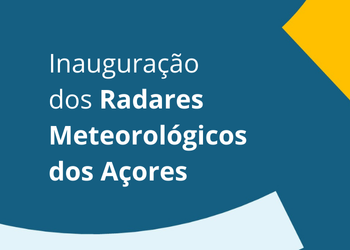New Meteorological Radars on Azores
 2025-01-24 (IPMA)
2025-01-24 (IPMA)
The ceremony to present and inaugurate the new meteorological radars of the Portuguese Institute for the Sea and Atmosphere, I.P. (IPMA) in the Autonomous Region of the Azores (RAA), located in São Miguel/Pico dos Santos de Cima and Flores/Morro Alto, will take place on 24 January 2025. These two new radar systems will complete the meteorological coverage of the entire national territory.
The new equipment is of the C-Band Doppler type with dual polarisation technology and will be complemented by two meteorological stations adjacent to the equipment and two electrical discharge detectors located at the airports of São Miguel and Flores, for a total investment of around €5 million, financed under the PRR programme.
The importance of ensuring full radar coverage of the Azores is extremely important, as this region is frequently affected by severe weather phenomena, influenced by tropical cyclones, which have a direct impact on safeguarding lives and property and on the development of socio-economic activities.
In this way, it is possible to improve the processes supporting the assessment of meteorological risks associated with maritime and air navigation in the Atlantic, contribute to permanent meteorological surveillance and also to very short term (up to 6 hours, nowcasting).short-term weather forecasting (up to 3 hours, ‘nowcasting’).
Until now, the national meteorological surveillance network consisted of radars in Coruche (1997, renewed in 2023), Loulé (2003, renewed in 2023)., Arouca (2014), Porto Santo/Madeira (2017) and Terceira/Azores (2020).
The images from both radars have been available for consultation since 24 January on the IPMA website at: https://www.ipma.pt/pt/otempo/obs.radar/
Alongside this inauguration, the Atlantic Climate Observatory will also be launched, taking advantage of the Azores' privileged pivotal position in the Atlantic. This infrastructure, which represents an investment of around €2 million, with co-funding from the Regional Government of the Azores, will collect atmospheric data, which is fundamental for studying climate change in the Atlantic region, particularly greenhouse gases.
The ceremony to present and sign the Cooperation Protocol will take place on 24 January at 10.45am at the Palácio de Sant'Ana in Ponta Delgada, in the presence of the President of the Regional Government, José Manuel Bolieiro, the Secretary of State for the Sea, Lídia Bulcão, the Regional Secretary for the Environment and Climate Action, Alonso Teixeira Miguel, the President of IPMA, José Guerreiro and the Regional Director of IPMA in the Azores, Carlos Ramalho.
Protocol signed between the RA Açores and IPMA, represented by the President of the Regional Government, José Manuel Bolieiro (left) and the President of IPMA, José Guerreiro (right)
Imagens associadas





